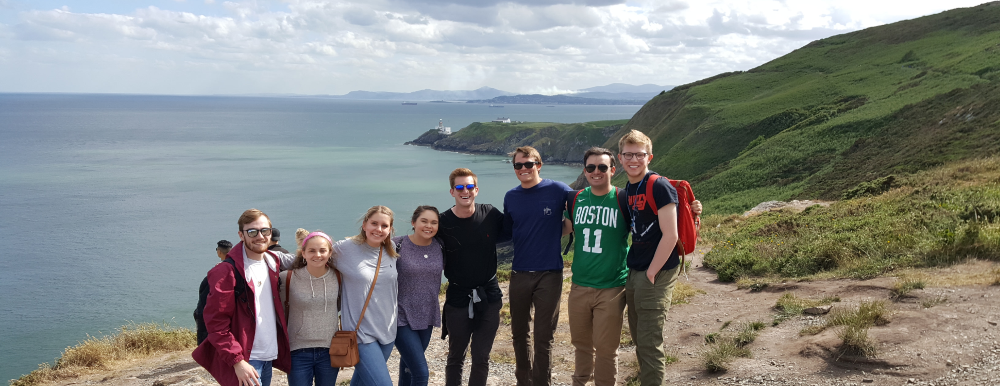
Irish Summer Institute
Introduction
On this program, students have the opportunity to study and discover not just one historic location, but three. The journey begins in Cork and Kerry where students visit sites of major historical, cultural, political, economic, and linguistic relevance. These locations act as a living classroom for CUA students as they learn to communicate through the Irish language while immersing themselves in Irish culture.
Then students travel to Ireland’s capital, Dublin, where they examine how plays staged in London and Dublin represented Ireland, its history, and inhabitants. Students tour Dublin and learn how the city’s streets and architecture served as a backdrop for a social drama in which Ireland’s subjects portrayed different characters.
View the
2025 Tentative Ireland Itinerary!
Location
Cork is a university city, which while compact in size, is vibrant and renowned for its warm personality and friendly people. It is the Republic of Ireland’s second city, whose history and development are very much set in a European context. While it has long been a city with a global outlook - during the 18th and 19th centuries it was a trading city of world significance - it also played a central role in Ireland’s own struggle for independence.
Kerry is home to one of the six Gaeltachtaí (Irish-speaking regions) of Ireland. While everyone living in the Gaeltacht regions can speak English, the everyday language of these communities is Irish. Kerry, therefore, helps maintain the continuity of the Irish tradition, and provides the perfect environment for people who wish to become proficient in Irish.
Dublin, a city whose median population is under the age of 30, is full of excitement and culture. There are several theatres, both modern and historic, and plays are performed year-round. Moreover, many of Dublin's buildings are deeply rooted in history, and on a simple stroll through Dublin’s streets students are bound to recognize places illuminated in Irish literature and folklore.
Academics & Curriculum
Students on this program enroll in two courses:
Dublin & the Invention of Ireland
Taught by Dr. Gregory Baker
ENG/IRSH 306 - Syllabus
3 credits, ENG/IRSH 306, Literature
Course Description:
From its origin as a Viking outpost to its emergence as "a big village and a dirty village where gossip reigns supreme," Dublin has been central to the development of Ireland, epitomizing the country's ability to continually invent and re-invent itself according to the demands of each new age. In this course we consider Dublin's linguistic, religious, and political complexities through the lens of the city's distinguished literary history. Topics include medieval Dublin and the Pale, the Georgian city and the Protestant Ascendancy, the Irish Literary Revival, the Abbey Theatre, the "exile" of James Joyce, the Easter Rising, World War I and the emergence of the Irish Republic.
Shakespeare to Sheridan: The Irish in the Theatre, 1600-1775
Taught by Professor Patrick Tuite
Syllabus
Course Description:
This course examines how plays staged in London and Dublin between 1600 and 1775 represented Ireland, its history, and inhabitants. Students will read the most important dramatic literature concerning Ireland written during this period, including works by William Shakespeare, George Farquhar, and Richard Brinsley Sheridan. In addition, students will tour Dublin and learn firsthand how the city served as a backdrop for a social drama. We’ll visit many places, like Dublin Castle, Trinity College, and the building that housed John Ogilby’s Smock Alley Theatre.
This 3-credit course is cross-listed in several departments:
| Undergraduate Level |
| DR 305* |
| ENG 305 |
| HIST 328A |
*Counts for Explorations in Fine Arts requirement.
Accommodation & Meals
Cork: Students are housed in single rooms at the University College Cork dorms. Students may eat at the university cafeteria at their own expense.
Dublin: Students are housed in single rooms at the University College Dublin dorms. Students may eat at the university cafeteria at their own expense. All meals are self-catered, though a Welcome Meal and Farewell meal are typically included in the program fee.
Twohig-Sullivan Family Fund for Irish Studies
Composed of generous donations from the Twohig-Sullivan Family, the Twohig-Sullivan Fund for Irish Studies exists to increase opportunities for Catholic University students to study abroad in Ireland, especially those students eager to enroll in the University’s annual Irish Summer Institute. Multiple, significant awards are made each year during the spring semester. These awards cover various expenses incurred by those who participate in the Irish Summer Institute. Applicants must be both US citizens and full-time Catholic University students in good academic standing. There is no minimum GPA.
Students receiving an award will be asked, on their return to Catholic University, to compose a statement describing their experiences in Ireland, and how precisely the Twohig-Sullivan Fund helped enrich their appreciation of Irish history, literature, and culture. This statement will be shared with the sponsors of the Fund to help illustrate the significant impact these resources have on our students’ education and their future.

